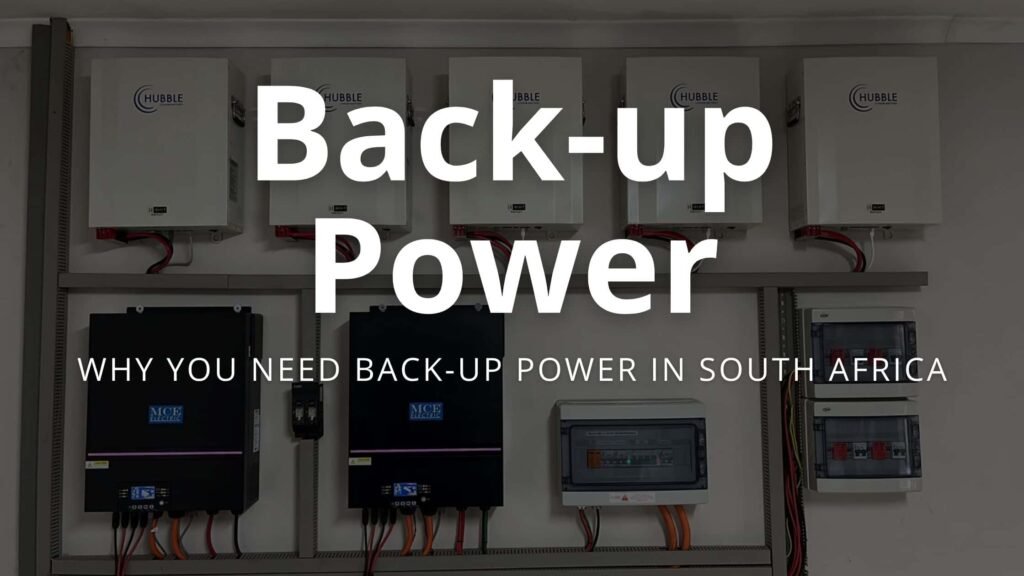Your cart is currently empty!

Power Outages in South Africa: Why Backup Electricity Units Matter
South Africa is famous for its breathtaking landscapes and diverse culturesWhy you Need Back-Up Power — but one challenge unites households and businesses across the country: frequent power outages caused by load shedding.
With aging infrastructure, growing demand for electricity, and climate-related disruptions, South Africans are learning the importance of investing in backup electricity units such as solar batteries, lithium storage systems, and inverters.
Here’s why having a reliable backup power solution is no longer optional — it’s essential.
1. Reliability and Consistency in Daily Life
Frequent load shedding disrupts businesses, schools, hospitals, and homes. With a backup battery or inverter system, South Africans can maintain normal routines even during scheduled blackouts.
- Keep WiFi, lights, and appliances running.
- Prevent disruptions to remote work and online learning.
- Ensure hospitals and clinics keep lifesaving equipment powered.
2. Protecting South Africa’s Economy
Unstable electricity supply has cost South Africa billions in lost productivity. Businesses face equipment damage, interrupted operations, and reduced efficiency.
A backup power system — whether it’s a lithium battery, solar storage system, or UPS — helps companies avoid downtime and safeguard their bottom line.
3. Health and Safety Benefits
- Medical equipment in clinics and hospitals must remain powered.
- Refrigeration prevents food spoilage during long outages.
- Backup power ensures safety systems and security alarms remain active.
4. Energy Independence with Solar and Lithium Batteries
Depending only on Eskom’s grid leaves South Africans vulnerable. Backup electricity units offer:
- Solar panel integration for renewable energy.
- Lithium batteries for efficient storage.
- Reduced reliance on unstable grid supply.
This independence means homes and businesses can enjoy uninterrupted electricity and lower utility bills over time.
5. Environmental Advantages
Backup power doesn’t have to mean noisy generators. Modern solutions such as solar batteries and renewable energy storage systems provide clean, sustainable electricity while reducing reliance on fossil fuels.
6. Adapting to South Africa’s Changing Climate
Extreme weather events like storms and heatwaves often damage infrastructure, causing further outages. Backup units — particularly solar + battery combinations — ensure a continuous power supply when communities need it most.
7. Power Access for Remote and Rural Communities
In rural South Africa, many areas are off-grid or poorly connected. Backup units, especially off-grid solar battery systems, provide:
- Reliable electricity for lighting and appliances.
- Improved communication and education.
- Better quality of life and economic opportunity.
8. Long-Term Cost Savings
Yes, the initial setup cost of a backup electricity system can be high. But over time, the benefits include:
- Lower electricity bills when paired with solar.
- Reduced reliance on fuel-based generators.
- A system designed for 15+ years of reliable service.
Conclusion: Backup Power Is No Longer a Luxury in South Africa
The reality is clear: backup electricity units are an essential investment in South Africa. They provide:
- Reliability during load shedding
- Economic protection for businesses
- Safety for homes and medical facilities
- Energy independence with solar and lithium batteries
- Environmental benefits through renewable energy
Whether for your home, business, or rural community, the long-term savings and peace of mind make backup power systems a smart choice.
Looking for reliable backup power? Explore our range of Hubble Lithium Batteries, solar-ready inverters, and energy storage solutions designed for South African conditions.
Frequently Asked Questions (FAQ)
1. What is the best backup power solution for load shedding in South Africa?
The most reliable solution is a combination of solar panels, lithium batteries, and an inverter system, offering long-term savings and sustainability.
2. How long do lithium backup batteries last?
Most high-quality lithium batteries, such as Hubble LiFePO4 models, last 10–15 years with thousands of charge cycles.
3. Are backup electricity units expensive?
While initial costs vary, they offer long-term savings by reducing electricity bills and preventing business downtime.
4. Can I power my entire home with a backup battery system?
Yes — with the right configuration of inverter, solar panels, and multiple batteries, you can run essential or even full household loads.

Leave a Reply